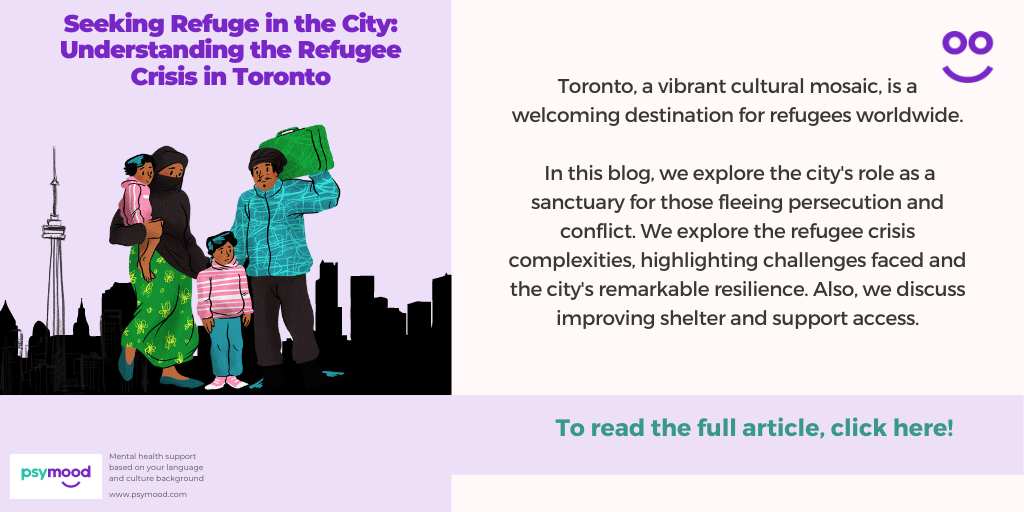Remote Work and Mental Health: Navigating Challenges and Promoting Balance
The city of Toronto, a vibrant cultural mosaic, has long been a welcoming destination for newcomers from around the world. Among those seeking refuge and hope are refugees, individuals fleeing persecution, conflict, or violence in their homelands. As the refugee crisis continues to unfold globally, Toronto has emerged as a sanctuary, embracing those in search of safety and a fresh start. In this blog, we delve into the complexities of the refugee crisis in Toronto, exploring the challenges faced by displaced individuals and the remarkable resilience of a city that opens its arms to those in need. As well as a look into what we can do to improve access to adequate shelter and support.
Recently, hundreds of refugees and migrants from Africa, seeking asylum were forced to sleep on the streets of Toronto due to overcrowding and lack of funding in shelters. They were left with no aid from the city even though the federal government had invited them to seek refuge in Canada and promised to protect them.
“They are caught in the middle of a funding battle between the city, the province, and the federal government over who is going to pay for their needs and accommodations. The city’s shelters are at capacity, they have been turning away refugees since June”. Since then the federal government has promised they will be providing an additional $210 million to fund and house asylum seekers. This has caused an uproar by folks across the city, some claiming that too much money is being spent while we already have an ongoing homelessness crisis, while others feel that the government needs to do more to support asylum seekers. Despite the funding battle from the government and differentiating opinions amongst Torontonians, one thing is a fact, these refugees came here to find a safe home and all they want is a better life.
Let’s take a look at some of the issues that refugees face here in Canada as well as worldwide.
Although Toronto promises a welcoming environment, refugees still encounter various challenges as they settle into their new lives. From language barriers and cultural adjustments to finding employment and affordable housing. This is currently a huge issue here in Toronto. Toronto already has a housing crisis and homelessness crisis, leaving shelters to be overcrowded. This means that the city does not have means of providing shelter for asylum seekers. This can cause a lot of stress and anxiety for asylum seekers as they have nowhere to go.
Moreover, refugees often face a range of other mental health issues due to the traumatic experiences they have endured during their displacement and journey to safety. These mental health challenges can be exacerbated by the uncertainties and stress of adapting to a new environment. Some common mental health issues experienced by refugees include; post-traumatic stress disorder (PTSD), depression, anxiety, panic disorders, adjustment disorders, grief and loss, psychosomatic symptoms, and suicidal ideation. It is essential to provide refugees with culturally sensitive mental health support and resources to address these mental health challenges. Trauma-informed care, access to mental health professionals, and community-based support services can significantly impact their healing and well-being as they navigate their new lives.
Knowing all this, how can we better support the asylum seekers that are coming to Toronto? As a start, we need to be able to provide shelters that can support the needs of asylum seekers, from providing shelter, food, and services to ensure their transition is easier. We need collaborative support from both government entities, NGOs, and individuals who can work towards supporting refugees. We also need to be able to support the people of Toronto who experience homelessness, we need to ensure that there is enough support to go around so we don’t shut doors on anyone seeking help.
By understanding the complexities of displacement and embracing the cultural richness that refugees bring, we can create a more inclusive and compassionate society. Together, let us continue to uphold Toronto’s legacy as a city that offers hope, healing, and new beginnings to those seeking refuge and a chance at a brighter future.
We as a city need to come together and find a sustainable and long-term solution to the lack of funding to support both our homeless folks and asylum seekers.
PsyMood is a digital tool designed to help you find the support you need in the language that you are most comfortable with. PsyMood considers cultural background, geographical location, interests, and personal needs, amongst other factors, to pair you with service providers for either online or in-person therapy sessions.
For More Interesting Posts
You may also be interested in learning more about Resources you can find as a Newcomer or Refugee to Canada, Resources for Refugees, Migrants and Newcomers to Canada, and Navigating Anxiety and PTSD: Newcomers Escaping Conflict and the Impact of Local News at their New Home.


.png)
.png)
.png)
Recent Comments